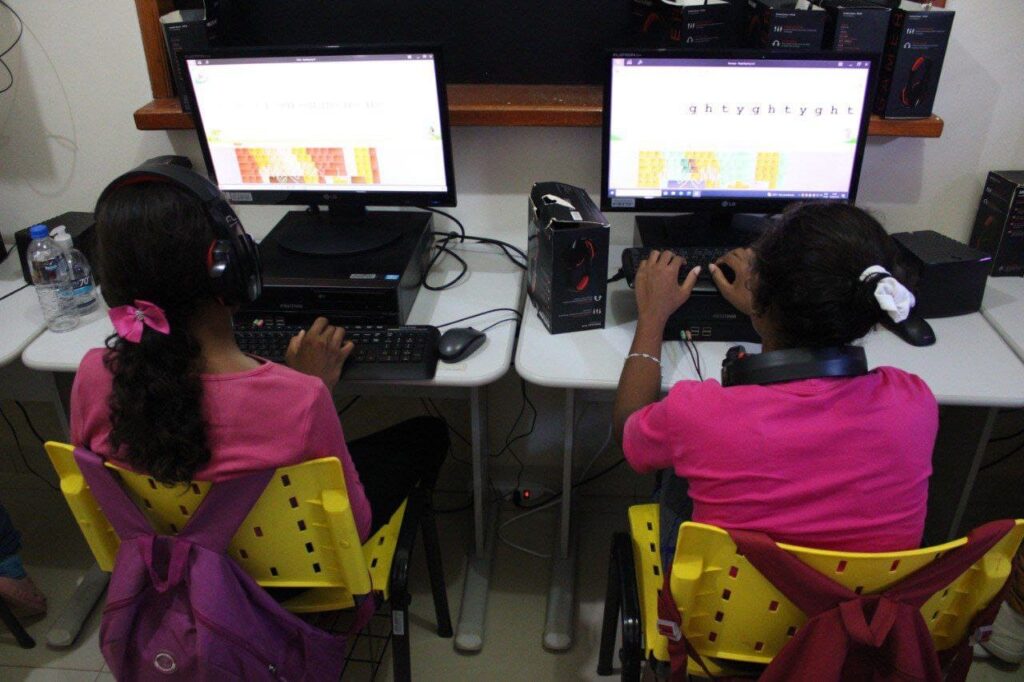In the digital era in which we live, mastering technology and computer knowledge has become a fundamental tool for personal and professional development. The Fraternity – International Humanitarian Missions (FIHM) recognizes the importance of offering technology training opportunities to indigenous migrants and refugees from Venezuela and to Guyanese and Brazilian ethnic groups living in the region..
In collaboration with the Macunaíma Educational Center, Fraternity – Humanitarian Missions (FIHM) is conducting a computer course for adults at the Indigenous Cultural and Training Centre (CCFI). This course is designed to provide this indigenous community with the basic technological skills to thrive in an increasingly digitized world and expand employment opportunities and a better quality of life.

Building a computer base
The computer course for adults began on April 10, has a workload of 200 hours spread over three months and receives students as young as 14 years old.
Teacher Fernanda Matis da Silva, graduated in IT and with vast experience in the area, is part of the team that has conducted this course with enthusiasm and dedication. Teacher Fernanda shared some remarkable results achieved by the students.
The course content covered a wide range of topics, from the history of computing to using the most popular computing tools. Students became familiar with the basic Office suite, which includes word processing, spreadsheets, and presentation software. Students also learned how to browse the Internet, create banners, embed animations, videos and hyperlinks, and convert their presentations into PDF files.
Participants worked on their resumes, portfolios and personal presentations adapted to formats that can be sent through various digital media, thus expanding their chances of contact with future job opportunities.

Cultural impact and Brotherhood
The course has been a meeting point for different indigenous ethnic groups, including Venezuelan Waraos and Pemons.
Teacher Fernanda highlighted the solidarity and mutual support that was manifested among the students and highlighted the case of two Warao sisters as proof of this. One of them was able to understand the content better, so she translated the information into her native language so that her sister could also learn and keep up with the group.
This example of fraternity, as well as others that occurred during the development of classes, marked the memory of teacher Fernanda, who recognized the cultural enrichment and learning that teachers also obtained from their students.

Dedication and Overcoming:
For some teachers, this is their first experience working with indigenous groups. On this point, Teacher Fernanda highlighted a particular difference between the indigenous group and other non-indigenous students with whom she has worked in the past: “Indigenous people stand out as more dedicated students.” And she added: “For them everything was new, they kept their focus and willingness to learn. They supported each other when someone didn’t understand.”
This focus and dedication allowed them to overcome other barriers, such as the Portuguese language. It was reported that, when the time came for the first assessment, few were able to complete it, as the test was in Portuguese. Realizing this language barrier, the teacher changed her strategy and, for the second assessment, translated the questions into Spanish. With this adaptation, all completed the test successfully, demonstrating a good understanding of the new knowledge acquired.
Students began to rely on the use of online translators for a better understanding of the contents, while developing fluency in the Portuguese language. In this way, they incorporated a new tool in their learning strategy.

Tools for success
Arasary, a student in this first edition of the computer course, shared the impact of this learning opportunity:
“I feel motivated to continue and also to help other people so that they can experience this computer course and, thus, open their minds, think beyond.
Computing is incredible, it allows us to know the world around us. With this learning I have the possibility to develop and try new projects. Information technology gives us the possibility of knowing the impossible.”






